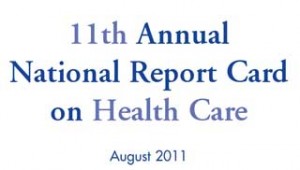 THUNDER BAY – What do you think of Canada’s healthcare system? According to the Canadian Medical Association, “Canadians want a health care system that empowers patients and provides them with greater accountability in their care through measures such as a patient health charter, a patient complaint and redress mechanism, such as allowing those who are not receiving adequate or timely care in their own jurisdiction to receive publicly insured care in another jurisdiction”.
THUNDER BAY – What do you think of Canada’s healthcare system? According to the Canadian Medical Association, “Canadians want a health care system that empowers patients and provides them with greater accountability in their care through measures such as a patient health charter, a patient complaint and redress mechanism, such as allowing those who are not receiving adequate or timely care in their own jurisdiction to receive publicly insured care in another jurisdiction”.
“Patients are too often lost in the shuffle in health care,” said Canadian Medical Association President Dr. Jeff Turnbull. “Canadians want their territorial, provincial and federal governments to get together and create a system that revolves around the patient, rather than the other way around, and they favour practical steps that can move us forward in that direction.”
The CMA has released its eleventh annual National Report Card on Health Care in Canada. The research focuses on access to health care services and shows clear support for specific measures to make the system more accountable to patients.
The CMA’s National Report Card uses public opinion data to assess the attitudes of Canadians regarding their experiences with the health care system. The Report Card is an example of the CMA’s commitment to advocate for the highest standards of health and health care for Canadians by tracking access to care and government action on the health care system.
The survey found:
- 87% of Canadians agree a new patient charter should contain a “complaint mechanism” to improve accountability to patients;
- 82% of Canadians agree that a patient health charter that outlines patients’ rights and responsibilities would make the system more efficient.
- 87% of Canadians agreed that a “patient health charter” should be a required part of the 2014 health care funding agreement between federal, provincial and territorial governments.
- 86% of Canadians agree that an independent ombudsman should be created by the charter to allow citizens to complain about poor health service.
- 80% of Canadians agree that the number of complaints against a jurisdiction should be reported so Canadians can compare jurisdictions to one another.
- 97% of Canadians agree federal/provincial/territorial governments need to start working together on a new health accord to replace the current agreement that expires in 2014.
- 93% of Canadians agree that federal, provincial and territorial governments should meet every year to discuss the state of health care in Canada
“We’ve been hearing for months now that Canadians expect their governments to take action on health care,” Turnbull said. “The public clearly understands that our health care system isn’t going to improve without political leadership at both the federal and provincial/territorial levels.”
Access
In addition to important information on how Canadians view measures to empower patients, the eleventh annual CMA Report Card also shows that public opinion about the health care system slipped when compared to last year. In 2011, only seven in 10 (70%) of Canadians asked gave the system an A or a B for overall quality of the health care services available. Last year three-quarters (75%) of those asked graded the system with either an A or B.
Governments
The 2011 Report Card showed a similar decline in Canadians’ perceptions of the actions of the federal government in dealing with health care, with 36% assigning either an A or B grade to its performance (41% in 2010). This year, 38% of Canadians graded the performance of their provincial government with either an A or B grade, down only slightly from 2010 (41%). The fading grades for both the provincial and federal levels of government indicate a general decline in positive views among Canadians toward health care services available to them and their families. The vast majority (83%) say that health services have either stayed the same (47%) or gotten worse (36%) since the last federal-provincial health accord was signed in 2004.
Methodology
The 2011 National Report Card Survey was conducted between July 5 – 8, 2011, via an online survey of 1,026 Canadian adults selected randomly from the Ipsos Household Panel. The results were weighted according to Census data. A sample of this size is associated with a ± 3.1 percentage point margin of error for the overall national findings at a 95% confidence interval. Between July 6 -7, Ipsos Reid also surveyed 1,000 Canadian adults using the Ipsos Reid Express Telephone Omnibus. The results were weighted according to Census data. This sample provides a ± 3.1 percentage point margin of error for the overall national findings at a 95% confidence interval.
The Report Card can be accessed at: www.cma.ca/2011reportcard

